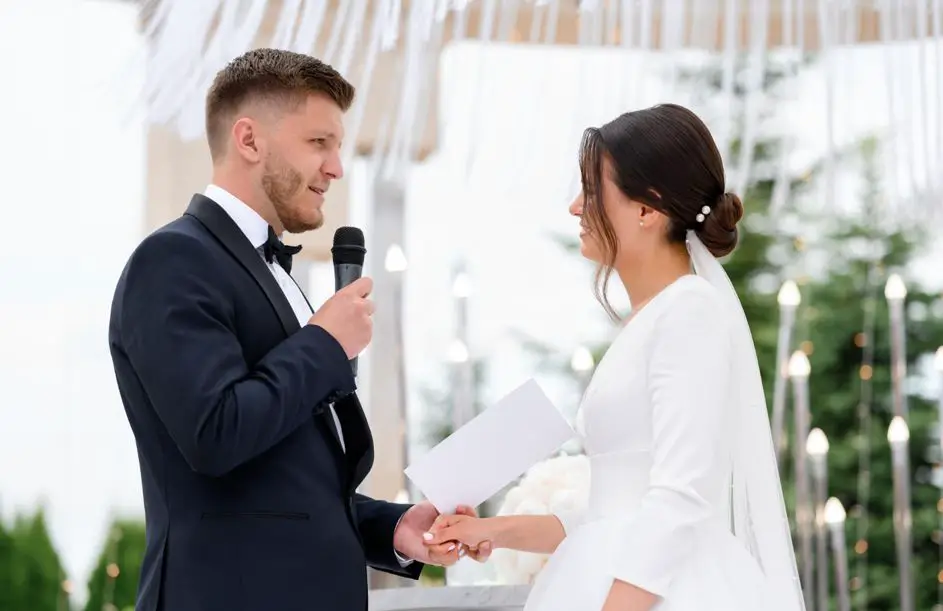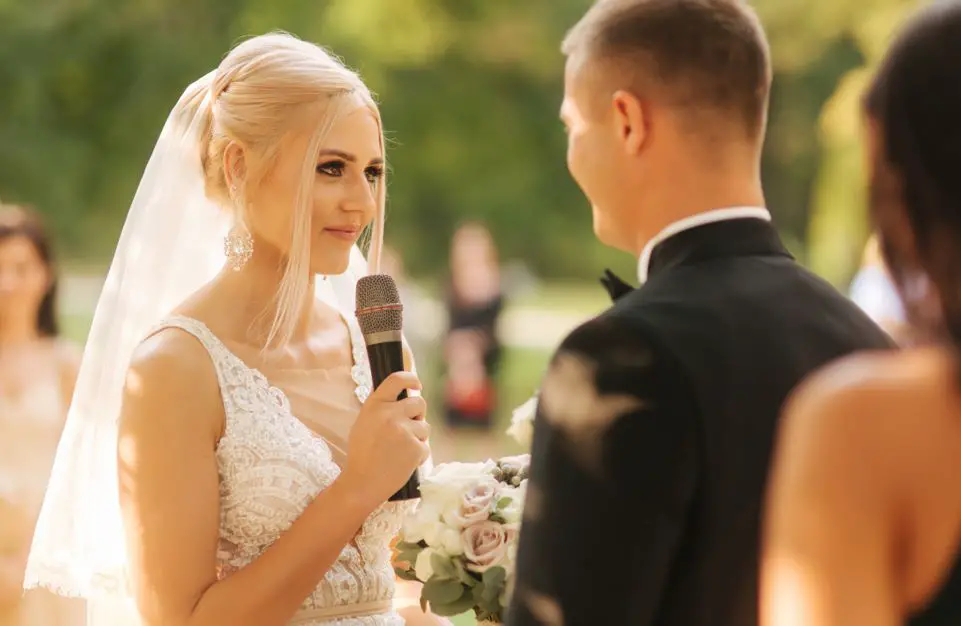Crafting a memorable wedding speech is all about blending authenticity with celebration. Creating a heartfelt and engaging speech can feel daunting, whether you’re the best man, maid of honour, or a family member.
In this guide, you’ll find practical tips for planning, structuring, and delivering a speech that will leave a lasting impact.
From timing your words perfectly to connecting with your audience, these pointers will help you make the most of your moment in the spotlight.
With the right approach, you can bring out the best qualities of the couple, offer meaningful well-wishes, and create a memory that they and their guests will cherish.
Let’s get straight to the point
Delivering a memorable wedding speech is all about authenticity and celebration. Start by planning-draft your speech early, introduce yourself briefly, and focus on one or two meaningful stories.
Highlight the couple’s best qualities and offer heartfelt well-wishes. Wrap up with a simple toast and practise for a smooth delivery.
Avoid overloading on jokes, stay sober, and have a copy of your speech ready. Engage the audience with eye contact and smiles, keep the speech focused on the couple, and stick to the time limit (4-6 minutes). Conclude with a positive note and a final toast to the happy couple!
1. Plan Your Speech In Advance

A well-prepared speech is much more effective than one quickly thrown together.
- Start Early: Draft your speech weeks before the wedding. This will give you plenty of time to revise and improve it. A rushed speech might miss important points or sound disjointed.
- Research Wedding Speech Traditions: Understanding who traditionally speaks and the tone they set can help you align your speech with the event’s flow.
- Coordinate with Other Speakers: Reach out to other speakers to avoid repeating similar anecdotes or themes. This collaboration ensures everyone’s speech stands out uniquely.
2. Introduce Yourself Clearly
Since only some people in the room will know you, a clear introduction helps establish your connection to the couple.
- Keep It Short and Sweet: A simple introduction like, “Hello, I’m Alex, the groom’s older brother,” is enough.
- Explain Your Connection to the Couple: Briefly describe your relationship with the bride or groom, adding a personal touch without wasting too much time.
- Transition Smoothly: Once you’ve introduced yourself, smoothly transition into the main part of your speech.
3. Structure Your Speech With Stories
Stories create engagement, so choose an anecdote that reveals something special about the couple.
- Pick One or Two Stories Only: Avoid a lengthy list of anecdotes. Instead, choose one or two that genuinely reflect the couple’s character or relationship.
- Share Moments Everyone Can Appreciate: Pick stories that guests can enjoy regardless of their relationship with the couple. Avoid overly personal stories or inside jokes.
- Connect the Story to Your Overall Message: Ensure your story has a clear purpose, relating it to the couple’s qualities or relationship strengths.
4. Express the Positive Qualities Of The Couple
Highlight what makes the couple unique and why they’re a perfect match.
- Focus on Their Best Traits: Describe the groom’s humour, the bride’s kindness, or any qualities that make them special.
- Highlight Their Compatibility: Discuss how the couple complements each other. For example, “Emily’s patience balances James’s enthusiasm.”
- Keep It Respectful: Avoid teasing or making jokes that might embarrass the couple. Focus on genuine admiration.
5. Offer Heartfelt Well-Wishes For Their Future
Wrap up the main part of your speech by expressing genuine hopes for their happiness together.
- Share Personal Advice (If Relevant): If you’re married, you could share a short advice, such as “Remember to laugh together every day.”
- Provide Hopeful Words if Unmarried: Even without personal experience, you can wish the couple a life full of joy and support.
- Keep It Uplifting: Your well-wishes should be hopeful and encouraging, creating a positive and happy ending.
6. Wrap Up With A Toast
Ending with a toast is a classic way to conclude your speech on a celebratory note.
- Keep It Simple: A short toast, like “Here’s to a lifetime of love and laughter,” is often best.
- Invite Everyone to Join In: Encourage guests to raise their glasses, inviting everyone to participate in the celebration.
- Look at the Couple as You Toast: Making eye contact with the couple adds a personal touch to the final words of your speech.
7. Practise Your Speech
Rehearsing out loud helps you feel comfortable and confident when delivering your speech.
- Practise in Front of a Mirror or a Friend: This lets you gauge your expressions, posture, and tone.
- Time Your Speech: Aim for four to six minutes. Practising with a timer helps ensure you don’t overrun your allotted time.
- Adjust Your Tone and Pace: Practice helps you refine your tone, making adjustments to highlight key points or add humour where appropriate.
8. Stay Sober Until After The Speech
It’s easy to want a drink to ease the nerves, but it’s best to save the celebratory drinks for later.
- Avoid Excessive Alcohol Before Speaking: Drinking too much can make it harder to stay composed and remember your points.
- Focus on Composure and Clarity: A clear head keeps you grounded and confident, making it easier to deliver your speech smoothly.
- Celebrate Afterwards: Toast with the couple and guests after your speech, allowing you to enjoy the moment fully.
9. Have A Copy Of Your Speech Ready
Even if you’ve rehearsed, it’s wise to have a backup of your speech.
- Bring a Printed Copy: Printed notes are useful, especially if nerves get the better of you.
- Save a Digital Backup: Keep a copy on your phone or other device as a backup option.
- Glance at Your Notes, Don’t Read from Them: Using notes as a reference is fine, but avoid reading your speech directly. Make eye contact with the audience whenever possible.
10. Maintain Eye Contact And Engage The Audience

Engaging with the audience adds warmth and sincerity to your speech.
- Look at the Couple Often: Glance at the couple, especially when sharing personal stories about them.
- Scan the Room: Occasionally look around the room to connect with the guests.
- Smile and Use Gestures: Smiling and gesturing naturally can make you seem more approachable and friendly.
11. Keep The Focus On The Couple
The wedding speech should honour the couple, not the speaker.
- Limit Stories About Yourself: While a story or two adds personality, avoid making a speech about yourself.
- Highlight the Couple’s Story: Focus on the bride and groom, celebrating their unique qualities and relationship.
- Use Their Names, Not “I” Statements: Referring to the couple by name keeps the attention on them rather than yourself.
12. Avoid Overloading With Jokes
Humour is welcome, but it’s important to strike a balance.
- Choose Light-Hearted Humour: A few gentle jokes are fine, but avoid anything that might offend.
- Focus on Sincerity: Combine humour with sincerity to maintain an emotional balance.
- Respect the Couple’s Feelings: Avoid jokes that could embarrass or discomfort the couple.
13. Speak Clearly And Slowly
Many people rush through speeches due to nerves, so take a deep breath and pace yourself.
- Pause for Emphasis: Pausing between sentences helps your words resonate.
- Project Your Voice: Speak loudly enough for everyone to hear, but stay natural.
- Practise Pauses: Use pauses to emphasise key points and let your message sink in.
14. Thank Key People
Gratitude goes a long way and acknowledges the support of those who helped make the day special.
- Start with Parents: Thank the bride and groom’s parents for their support and contributions.
- Acknowledge Wedding Planners or Hosts: Mention the planners or organisers for their efforts.
- Thank the Guests: End with a warm acknowledgment to everyone who attended.
15. Stick To The Time Limit
A well-timed speech respects the audience’s attention and keeps the event flowing.
- Aim for 4-6 Minutes: This length keeps your speech engaging and avoids losing the audience’s attention.
- Edit Out Unnecessary Parts: Remove any parts that don’t add value or seem redundant.
- Practise with a Timer: Timing yourself during practice ensures you stay within the recommended length.
16. End On A Positive Note
Finish with a strong conclusion to leave guests feeling inspired and joyful.
- Close with a Positive Message: Offer hope or happiness for the couple’s future.
- Invite a Final Toast: Prompt the guests to join with one last celebratory toast.
- Thank the Audience: A warm thank-you and a smile end the speech on a friendly note.
Conclusion
When creating a memorable wedding speech, these handy hints will ensure you strike the right balance of authenticity, humour, and heartfelt celebration.
Whether you’re sharing a touching story, offering well-wishes, or raising a final toast, each element of your speech should reflect the joy and warmth of the occasion.
With careful preparation, a personal touch, and a focus on the couple’s unique bond, your words will create a moment they’ll cherish forever.
Embrace the moment’s joy, engage with your audience, and most importantly, let your genuine admiration for the couple shine through. Here’s to a speech they-and you-will always remember!

